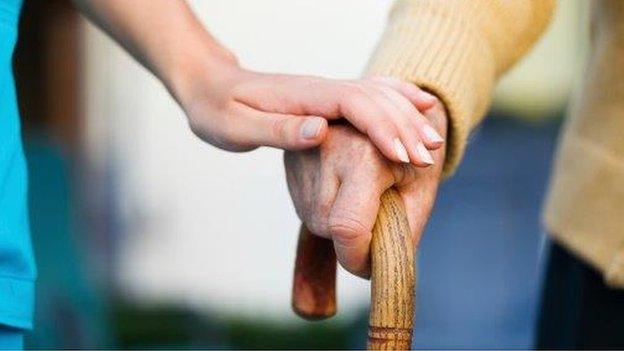Living Wage 'could harm home care sector'
- Published

The National Living Wage could result in a "catastrophic failure" in the home care market, the industry is warning.
About 500,000 vulnerable over-65s rely on the support, which includes help with washing and dressing.
But in a letter to the government, the UK Homecare Association said unless extra money was put into the sector, it would leave services "unviable".
The majority of care is bought by councils, but the group said they do not pay enough for care firms to cope.
Under plans announced in the Budget, workers aged over 25 in the UK will be paid a minimum of £7.20 an hour from April next year, rising to £9 by 2020.
The UKHCA believes the introduction of the National Living Wage will require councils to pay a minimum price of £16.70 an hour for services.
This is based on using the cost of paying the National Living Wage and then adding to that the costs of running the service, including travel costs for staff and pension contributions. Just under 50p has been set aside for profits.
But, according to research published by the UKHCA earlier this year, the current average is £13.66, which the organisation argues is not even enough for care providers to meet their current obligations in terms of the minimum wage.

The letter, sent to Chancellor George Osborne and seen by the BBC, says unless extra funding is provided by councils "there is a serious risk of catastrophic failure" as some providers may be driven out of the market.
The UKHCA believes an extra £750m may need to be put into the system next year to cope with the National Living Wage demands.
"Without urgent action from government and local councils to address the deficit in funding, continued supply of state-funded home care will become unviable," it says.
The letter goes on to say councils should receive more money for social care in this autumn's spending review and care services should be "zero-rated" for VAT.

BBC Cost of Care project

The BBC has launched an online guide to the care system for the over-65s. The "care calculator" covers both residential care and the support provided in people's own homes, for tasks such as washing and dressing.
Users can submit their postcode and find out how much each service costs where they live in the UK.
There is also a dedicated BBC Cost of Care website with news stories, analysis and video.

UKHCA policy director Colin Angel said: "Providers are particularly concerned that they're not going to be able to deliver services to people who are funded by local authorities.
"There is certainly anxiety that providers will be going out of business and that those providers won't be there to carry on delivering services to some of the most frail and vulnerable members of society."
Research by the Resolution Foundation think-tank has also demonstrated the scale of the challenge for the care sector.
Its analysis predicts up to 1m of the 1.4m workers across the whole care sector - that includes in care homes and those looking after younger disabled adults - could end up getting pay rises by 2020.
Laura Gardiner, from the foundation, said implementing the policy will be particularly "challenging" for the care sector and "require significant investment".
She said: "It is unrealistic to expect councils to find this extra money given the scale of cuts they're facing.
"It is important therefore that central government steps up and commits to providing this vital investment in social care, which will give a major boost to staff and improve the quality of care."
The warning follows similar concerns raised by the Local Government Association last week. It said one in 20 people working directly for councils earned less than the National Living Wage.
LGA chairman Gary Porter said: "Local authorities have made £20bn in savings since 2010 and are likely to face further funding reductions and spending pressures over the next few years.
"It is vital these costs are considered by the government in the wider debate of council funding."
A government spokesman said: "The National Living Wage will benefit hundreds of thousands of care workers who will see their pay increase.
"The overall costs of providing social care will be considered as part of the spending review later this year, and we are working with the care sector to understand how the changes will affect them."
- Published28 July 2015

- Published14 September 2016
